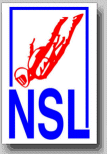DeLand - Kurt Gaebel grew up in a constant state of competition. In his native Berlin, his life revolved around playing soccer. He even played in a semiprofessional German league. But after taking his first leap from an airplane, his sense of rivalry fell to the wayside. Some people call skydiving a drug, and Gaebel was hooked. Totally hooked. He made regular trips to the United States to skydive, jumping hundreds of times. When he moved to the states several years ago, he even picked DeLand as his new home because of its thriving skydiving business. "Skydiving took me away from soccer, but there was still something missing," Gaebel recalls. "That something was competition." There were no places for him to feel the adrenalin rush that comes with beating another team on the playing field. So he took it upon himself to create the National Skydiving League, which has grown in three years from a small Florida league to 15 leagues across the country. Gaebel works as the league's president, CEO, chief financial officer, sales and marketing director and public relations director. In other words, he's a one-man show. And he likes it that way. "I really needed to work full time with this," says Gaebel, who sold 49% of the league to silent owners after the league's first year. From a competition standpoint, the National Skydiving League works just like other sports leagues. Several four-man teams make up each league. Participants meet four to six times during the summer for a competition. Winners of the statewide leagues then meet in a national competition for the championship.
Satisfying a need:
Although there are prizes, the skydivers really just want a chance to compete. "Out team is kicking butt," says Bob Hallett, owner of Skydive DeLand. "It's tops in Florida." Hallett is one skydiver who is glad that Gaebel started up the league. He's been skydiving since he was 8 years old, yet has been able to compete in national competitions just a couple of times a year. "I've found other directions to pursue, but I never hung up the competitive edge," Hallett says. "For years, a competitive team had numerous opportunities to train, but few opportunities to compete. This gives teams an opportunity to go head to head and find the level that they are at." For Gaebel, there also is a money-making opportunity in the National Skydiving League. Each team pays a small registration fee, and each competition site also pays a fee. On top of that, Gaebel sells sponsorships for the events, which range in price from $400 for a small event to $50,000 for the national championship. He also hopes to sell television rights to league events and is in talks with the Sunshine Network about broadcasting a national championship. "Ther's a very good chance (of the league being televised) since extreme sports are becoming mainstream," Gaebel says. "With all the new sports channels, they need footage to fill, and this is very attractive." With all the growth in his league, Gaebel looks back with a bit of surprise. "I didn't expect it to be this size," he says. "It's a little scary, and I don't want the ship to get out of my hands."



